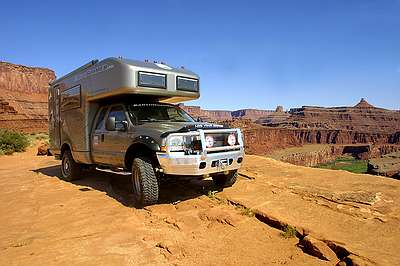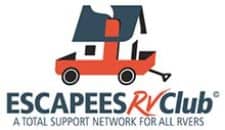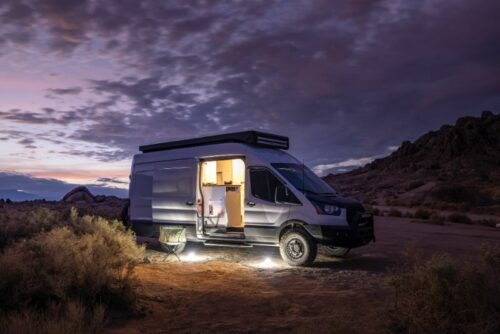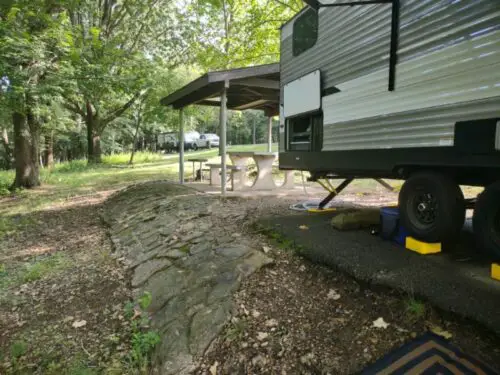Starting point for new RVers
If you are new to RVs, we recommend the Getting Started checklist on our web site, which walks you through the learning and decision steps for determining which RV is right for you.
Where can I learn the meaning of RV terms and jargon?
The RV industry, like any other, has its own set of terms and jargon. To help you learn the meaning of these terms, we compiled a Glossary of RV Terms.
Also, we sprinkled our web pages with special links that allow you to hover with your mouse for a brief definition or click on the link to go to the glossary. Here is an example of our special glossary link: toad.


What are the different RV lifestyles?
The major RV lifestyles are the following:
- Camper or Weekender: Those who take very short trips in their RV, typically over a weekend up to about a week.
- Vacationer: Longer trips lasting up to several weeks.
- Snowbird: Takes the RV to warmer climates for an entire season and returns home in the summer.
- Fulltimer: Those who live in the RV as their only place of residence.
For a more detailed look at the different lifestyles, see RV Lifestyles Examined.
What amenities are available in a typical RV?
At the very minimum, an RV provides temporary living accommodations consisting of a bed, food storage, food preparation, and dining area. On very small trailers, cooking and dining facilities may be accessible only from the outside. Most RVs include the following amenities:
- Bed with mattress
- Kitchen with sink, stove, and refrigerator
- Bathroom with sink, toilet, and shower
- Living area consisting of table, chairs, and sofas
- Heating and air conditioning
- Entertainment electronics such as a TV, radio, etc.
For a complete list, see RV Amenities.
Do I need a special license to drive an RV?
A great majority of RVs can be driven with a regular driver’s license. However, some states require a special license for large RVs. In rare cases a Commercial Driver’s License (CDL) is required—if you are told that you need a CDL, be sure to do more research because very few non-commercial RV’s fall into this category. If your RV meets one of the following criteria, check with your state for special driver’s license requirements:
- Single vehicle or towable combination having a weight rating of 26,001 lbs. or more
- Towing a trailer with a weight rating of 10,001 lbs. or more
- Is longer than 45 feet
- Towing two units (for example, towing a boat behind a trailer)
See RV Driver’s License Requirements for a summary of the fifty states.
Where can I find online RV discussion groups?
The two most common online discussion group types are forums and public newsgroups. Forums are usually hosted by a company or organization, and they set the membership requirements. Public newsgroups are open to the general public. Both are good sources of information, though we prefer the public newsgroups because they tend to be more active.
Newsgroups can be read and posted to using “news reader” software or by using the Google web site. To access the main RV newsgroup via Google, follow this link: rec.outdoors.rv-travel. Once there, sign up for a free account so that you may post new messages and reply to others.
More details are available on our Discussion Groups page.
Is RV camping possible with a car or SUV?
Yes, there are a good number of small, light-weight trailers that can be pulled behind full-size cars, SUV’s, and vans fitted for towing. The best type of RV for light vehicles is the Folding Trailer (also called a tent trailer). See our list of Folding Trailer RV Manufacturers.
Is an RV a good option as cheap, stationary housing?
An RV is usually not the cheapest housing option. Even with an inexpensive unit, the costs of the RV, site rent, electricity, and propane will be at or very near the rent of a small apartment. In addition, an RV will require more time and money to maintain than an apartment, eating into your savings. We have met individuals who live very frugally in small RV’s, but these are the exceptions—the lifestyle changes required to make this a reality would be considered too harsh by most
Andy Herrick is a blogging nerd, #8 Enneagram, wannabe bread baker, INTJ, RV industry professional, and small business entrepreneur. He can be found hanging out with his lovely wife and family, skiing, cycling, climbing, hiking, and convincing anyone who will listen why dogs aren’t really that great of pets. Also, he runs this website.










